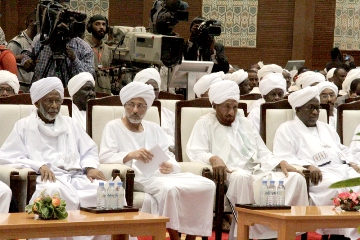Sudan’s PCP blames government for death of protester at Khartoum university
March 24, 2014 (KHARTOUM) – The Sudanese opposition Popular Congress Party (PCP) has held the government and the University of Khartoum (UofK) administration responsible for the death of Ali Abakaer Moussa Idris earlier this month.

The PCP mentioned that the criminal report stated that Idris was shot by a Kalashnikov rifle from from a distance of 18 yards, stressing that the PCP demands retribution and rejects impunity.
It described the government’s crackdown on the opposition mass meeting this month as a “slap” on the face of the national dialogue, saying it is a harmful move against the political process.
The PCP political secretary, Kamal Omer Abdel-Salam, said at a press conference on Monday that the crisis in Darfur is a natural result of the system of governance, denouncing what he called “systematic killing” in South Darfur and east Jabal Marra.
He warned against repeating the scenario of South Sudan secession in Darfur and described the killing of thousands of people in Darfur as “real tragedy, saying the crisis would only be resolved through a wise and comprehensive dialogue.
Abdel-Salam disclosed that his party would immediately resort to other options if the dialogue with the National Congress Party (NCP) failed, expressing keenness to make the dialogue a success.
The PCP official pointed to the nomination of national independent figures to head the dialogue mechanisms besides making contacts with political forces and rebel groups to join the process especially as the coming period requires concerted efforts.
He scoffed at the rumors that PCP leader Hassan al-Turabi would mediate between the Sudanese government and Saudi Arabia to resolve the recent tensions in relations, asserting that Riyadh doesn’t even permit Turabi to perform Hajj [pilgrimage] let alone allow him to lead mediation.
He said that PCP’s acceptance of unconditional dialogue with the NCP was not a result of a secret deal between the two parties but based on objective issues, describing it as a right decision particularly as the countryigaces a deep crisis that does not allow for setting preconditions.
Abdel-Salam underscored that their goal is not to join the government and noted that they opposed the regime for 15 years, reiterating that the purpose behind their participation in the national dialogue is to arrive at solutions for Sudan’s problems.
The PCP official further said that reunification of the Islamic Movement (IM) is a strategic issue but they currently aim to achieve unity of the nation, stressing the PCP and the NCP don’t seek to form an ideological alliance against the other political forces but to uphold values of freedom and democracy.
The Sudanese president Omer Hassan al-Bashir met with Turabi this month for the first time since the political fallout between the two men in 1999 which led to the split of the ruling party.
Bashir and the godfather of his regime during the first ten years agreed to accelerate the preparation for the holding of the national dialogue with the participation of all the political and social components of the country.
Abdel-Salam noted that the PCP made contacts with the opposition National Umma Party (NUP), Sudan’s Communist Party (SCP), Nasserite Party, and the Movement of New Democratic Forces (HAQ) to brief them on their dialogue with the NCP, emphasizing they will also meet with the Sudanese Congress Party and the rest of the opposition alliance parties for the same purpose.
Meanwhile, the PCP disclosed that rebel groups in Darfur expressed preliminary approval for engaging in the national dialogue inside Sudan’s territory if the government offered certain guarantees.
The PCP secretary of foreign affairs, Bashir Adam Rahma, told the government-sponsored Sudan Media Center (SMC) website on Monday that his party led direct contacts with Darfur rebel groups and political parties which rejected the NCP call for national dialogue to discuss possibility of joining the dialogue process.
He added that armed rebel want the government to pledge to allow public freedoms, issue general amnesty for rebel groups and declare cease fire.
Rahma said the PCP conveyed the message of the rebel groups to the government, asserting they seek not to delay the dialogue.
He also said that during their meeting with the SCP that the latter expressed willingness to change its position towards the national dialogue, saying it is illogical that any party sets preconditions for the dialogue.
Rahma further asserted that the goal of the national dialogue is to unite the Sudanese people not the PCP and the NCP, saying unity of the two parties at the present time is useless.
In a televised address to the nation late last January, the Sudanese leader announced a four-point plan for reform “to stop the war and bring peace, free political society, fight against poverty and revitalize national identity”.
He further called for political forces and even rebel groups to lay down arms to engage in dialogue to agree on the implementation items to achieve these objectives.
Bashir afterwards met with several opposition leaders, but it is not yet clear how the dialogue call will be implemented amid deep skepticism over the willingness of the ruling National Congress Party (NCP) to implement deep reforms.
So far NCP officials, including Bashir, have brushed aside opposition calls for the 2015 elections to be delayed and the formation of a transitional government that would work on drafting a new constitution to prepare the country for the polls.
The opposition National Umma Party (NUP) and the opposition Popular Congress Party (PCP) are the only major opposition parties who have so far accepted Bashir’s call for national dialogue.
But both parties warned that they would pull out of dialogue with the NCP if no progress is made.
(ST)
